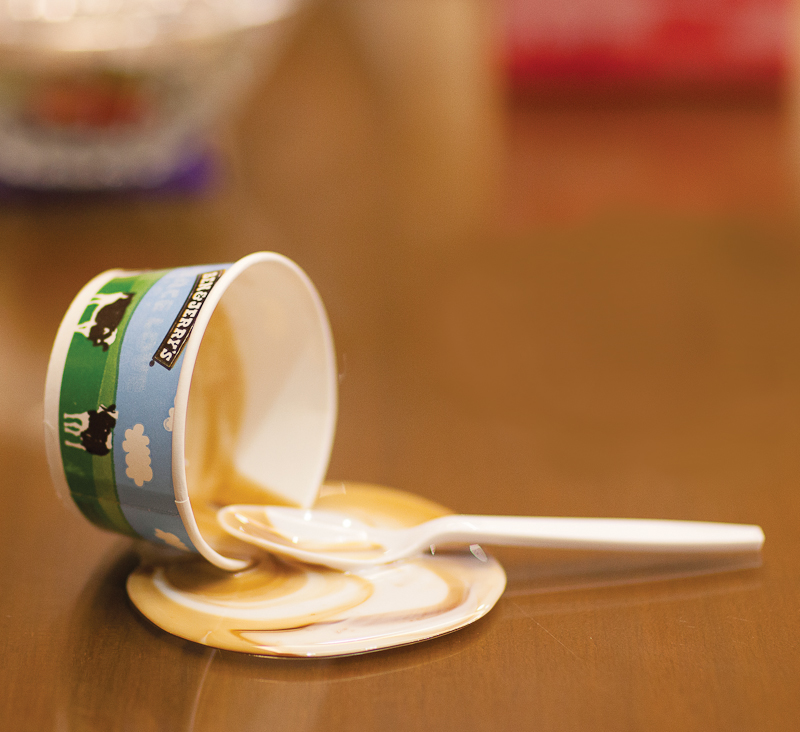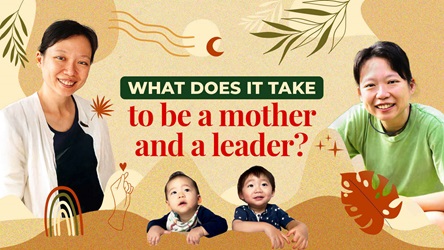“Your Ultimate Boss Is The Citizen Of Singapore”, Tan Ching Yee

Most people buy knick-knacks abroad as a souvenir of their holiday.
For Mrs Tan Ching Yee, the Permanent Secretary for Health, a life-like fake spilled cup of ice cream – which sits innocuously in her office – has found an unexpected function.
Bought at the Ben & Jerry’s factory in New Jersey during a family vacation to America last year, this plastic-and-cardboard prank toy has turned out to be a fascinating tool for observing people.
Smiling, she says: “I don’t buy souvenirs as they’re usually frivolous, but I’ve found this to be a very interesting experiment. Most men who come in either comment or do something about it, like try to clean it up. Women would say, oh, don’t touch it, I’ll get someone to clean it up.
“Most times, people who step into my office and see it probably think I’m a slob, eating ice cream in my office!”

It’s apt that for Mrs Tan, who read economics at Cambridge on an Overseas Merit Scholarship, even a quirky keepsake should have its utilitarian value.
And, perhaps reflective of her years working first as a statistician at the Department of Statistics, then as a research economist at the Ministry of Trade and Industry (MTI) – think averages, medians, big picture – she prefers to view her career by moderate measurements.
Declining to reveal her highest and lowest career points, or her biggest accomplishments and regrets, she says: “Life expectancy for women in Singapore is 84, so I will give you the answer when I know it’s nearer that end!
“One mustn’t be taken in by extremes,” she adds, with a laugh.
Still, it’s fair to say her accomplishments are impressive. After positions at MTI and the Ministry of Education (MOE), Mrs Tan rose to become Chief Executive Officer – at age 37 – of the Infocomm Development Authority of Singapore in 2002. Concurrently, she was also Deputy Secretary (Infocomm and Media Development) at the former Ministry of Information, Communications and the Arts.
In 2005, she was appointed MOE’s Second Permanent Secretary, receiving a Public Administration Gold Medal three years later. Now 48, she took over her current role just over a year ago.
She reveals that while she was sad at leaving MOE, she was happy to join MOH because it allowed her “to [restart] the learning process”. She explains: “When you are too long in a place, you get emotionally attached to the job. You also become less objective about it. You become desensitised and you think you’ve done it all before.
“I also didn’t want it to be a situation where people would say, ‘no need to check the files, I’ll just ask you.’ I don’t want to be a living registry!”
Learning a new language

A year into her portfolio at MOH, Mrs Tan is candid about having to learn a different language and “a new set of acronyms”.
“Ever so often, I’ve found it necessary to check Wikipedia or Google for medical terms, which we use quite a lot here,” she says. “Of course, I also turn to the Director of Medical Services, and he always has a clear layman explanation for me!”
Beyond that, she is busy dealing with the extensive review of Singapore’s healthcare financing system, which reportedly will take more than a year to complete.
During the interview, Mrs Tan, who has been through similar sweeping reviews in Mother Tongue policies at MOE, takes pains to explain Singapore’s current 3M system of Medisave, Medishield and Medifund, the rationale for their being and why the system needs to be reviewed to be ready for the future.
But at the end of the day, she says, the crux of the issue is managing affordability and availability of medical and health services, against financial sustainability, that is, who foots the bill.
She explains: “Every country has to fight the same demons. It’s an extremely complex system. You’re trying to strike a very uneasy balance among competing outcomes. But at some point, somebody’s got to pay for it. It could be us, our children or our future grandchildren.
“At MOH, that’s the issue. We recognise that our system may have put a little too much emphasis on sustainability and relatively less on assuring Singaporeans. So we can actually make that adjustment.
“Obviously, a headline conclusion is that the government’s share probably has to go up. How much and where we spend those extra government dollars are not easy decisions to make. If we put them in the wrong places, we could be over-incentivising and over-consuming services, which are very real. They are not bogeymen we invented in order to scare Singaporeans.”
She also points to how doctors in the public sector use generic drugs that are bought in bulk at lower prices, while private doctors “sometimes buy branded drugs to differentiate themselves, or they don’t get good drug pricing”. “People must understand that a difference in price does not always represent a difference in quality,” she adds.
Heart on her sleeve
She speaks of her own experience as a member of the sandwich generation, with three children aged between 10 and 19, and her elderly parents to take care of.
One of her pet peeves is the lack of empathy and civic consciousness in society. If we are going to create a city for all ages, she says, then “we need to re-design a lot of our hardware and software”.
By “hardware”, Mrs Tan means elderly-friendly infrastructure such as bigger rest benches and signage, and smart pedestrian crossings. But the “software” is “the most difficult to achieve”.

But empathy, she says, is “a common requirement” across the Public Service, noting it is worn on the sleeve “a lot more” in the “social ministries” such as MOE, MOH and the Ministry of Social and Family Development, where policies have a direct impact on people.
“I always tell my colleagues, look, your ultimate boss is the citizen of Singapore; it’s not me, it’s not [Health Minister] Mr Gan [Kim Yong].

“Every now and then, you have to remind people why we are here.”
For Mrs Tan, it’s that element of building good relationships that has worked the most for her. She credits her having come this far to her “acting like a sponge”: watching how her bosses, peers, subordinates and support staff behave.
She says with a grin: “You watch each of them, you absorb a bit and you may unfairly put it into your own method. Then you become better and better. So that’s how it’s worked.”
You could say the secret to her success lies in that little ice cream cup on her coffee table.

Coffee. I try to limit to at most two cups a day.
Where do you usually have your cuppa?If I’m in the office in the morning I’ll ask my PA to buy me a kopi C kosong. If I have a lunch or dinner engagement outside, it’s a cappuccino without sugar.
- POSTED ON
May 14, 2013
- TEXT BY
Denyse Yeo
- PHOTOS BY
John Heng









